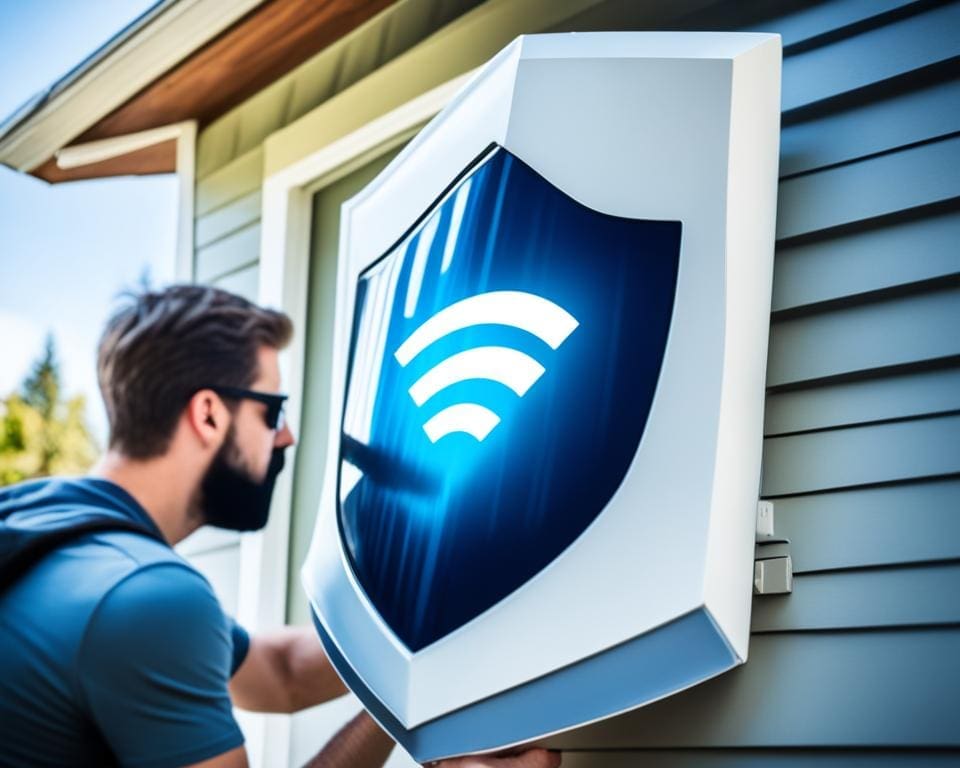Nowadays, our homes are filled with devices that connect to the internet. This makes it very important to protect your home network. Devices like smartphones and smart appliances can be weak spots. Cybercriminals might try to get your personal and sensitive information through them. Without the right protection, your data could be stolen, or you could be attacked online. Keeping your network safe is key to a worry-free online experience.
Starting on the path to a secure network is important. You need to take steps that keep dangers away and put you in charge of your online space. This means changing your router’s default settings and using strong encryption. Every action you take adds a layer of protection against unwanted access.
Making your home network a priority means your information stays safe. It also makes the digital world safer and more secure for you and those you care about. We will look at key ways to make your home network more secure. You’ll learn tips that can greatly improve how safe you are online.
Essential Strategies for Securing Your Home Network
Keeping your home network safe is vital for your privacy and safety. Applying strong Network Security Measures will improve your Home Network Protection. Here are important steps to make your home network more secure.
Change the Default Username and Password
First, change your router’s default username and password. Hackers can easily find default credentials online. Create a strong password with letters, numbers, and symbols, making it at least twelve characters long. This makes unauthorized access harder and keeps your network safe.
Turn on Wireless Network Encryption
Implement WPA3 or WPA2 encryption to protect your network communications. Encryption stops outsiders from snooping and keeps your data safe. Use a strong passphrase with twenty characters or more to ensure all devices, including IoT gadgets, are secure.
Hide Your Network from View
Hiding your network SSID is a smart security step. It makes your Wi-Fi invisible to others unless you tell them the name. By doing this, you prevent unknown users from trying to join your Wi-Fi. It’s a handy tip for Home Network Security Tips.
Keep Your Router Software Up to Date
It’s key to regularly update your router’s firmware. Updates fix security holes, improve data handling, and boost performance. Make sure automatic updates are on, so you get the latest security fixes. It’s a critical part of keeping your network secure.

Top Security Tips for Protecting Your Home Network
Protecting your home network is more important than ever. Many don’t realize the dangers of unsecured Wi-Fi. Here are key strategies for top home network security.
Use a Virtual Private Network (VPN)
Using a VPN is a top safety tip. It encrypts your internet traffic, making data unreadable to hackers. It hides your IP address too, making you more private online. Sadly, about 45% of people don’t use a VPN, risking their data.
Enable Network Firewalls
Turning on your router’s firewall is critical. It watches traffic and protects your network. Yet, only 15% use this feature. Most routers have easy-to-enable firewalls. It’s essential for home network security.
Disable Remote Administration
Keep remote administration off unless necessary. It’s a risk if always on, leading to breaches. Currently, only 10% disable it, which means many can improve security. Turning it off strengthens your network against threats.
Home Network Security Best Practices
Keeping your home network safe is crucial. Start by checking the devices connected to your network often. This helps spot any uninvited connections that could harm your network. Make sure your Wi-Fi has a strong, unique password. Also, ensure that any device connecting to it does the same to improve security.
Adding MAC address filtering adds more safety, allowing only chosen devices to connect. This step stops unwanted access and boosts your network’s defence. Also, using WPA2 encryption keeps your wireless network’s communications private and secure.
Changing your Wi-Fi password regularly, despite it being a bit of a hassle, is a good move. It’s important to keep up with these security steps. They help safeguard your personal info and data from online dangers. Doing so strengthens your network against threats for years to come.








